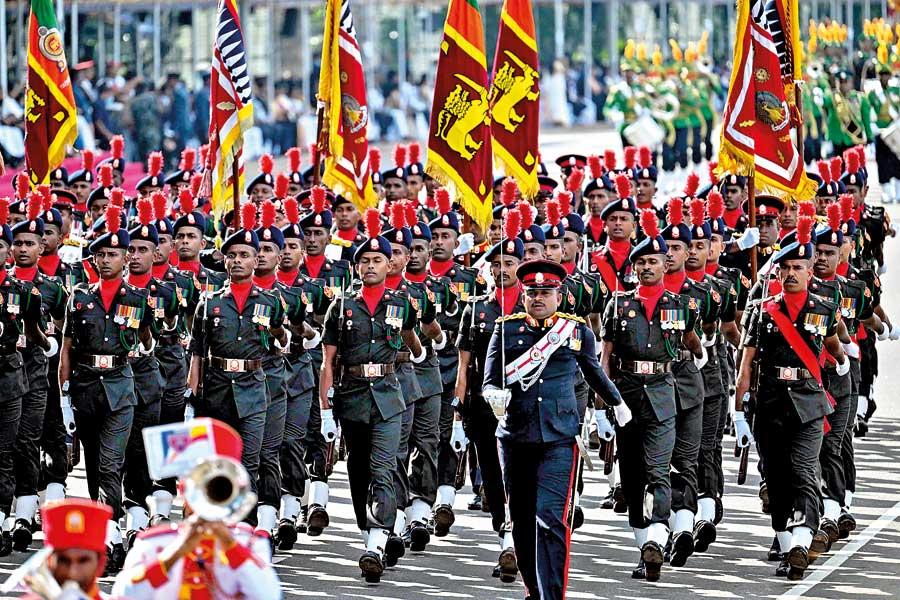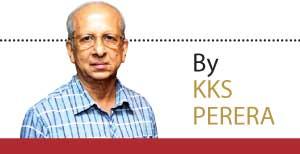06 Feb 2023 - {{hitsCtrl.values.hits}}

The 75th anniversary was celebrated amidst a certain degree of vagueness and tension (Picture AFP)
The 75th anniversary was celebrated amidst a certain degree of vagueness and tension. This would be an ideal occasion for both, the rulers and the people to ponder on the issues which would form the country’s future. All political groups have failed to deliver. Today people are left with no alternatives. Most people see none and those that are able to, are leaving the country in search of greener pastures. We badly need an alternative to the unskilled and corrupt politicians who hang on, despite being patently unwelcome, hence people themselves need to form those alternatives.
would form the country’s future. All political groups have failed to deliver. Today people are left with no alternatives. Most people see none and those that are able to, are leaving the country in search of greener pastures. We badly need an alternative to the unskilled and corrupt politicians who hang on, despite being patently unwelcome, hence people themselves need to form those alternatives.
The13th Amendment to the Constitution is again in the news. With President Wickremesinghe’s bombshell in Parliament, the majority of main parties were supportive with Kiriella, Mahinda Rajapaksa and Harini Amarasuriya responding favourably. Full implementation means mainly the Police powers and Land. The 13A says it is necessary to formulate a national policy on the use of State land-based purely on technical aspects, and not political or communal aspects. The Government should create a National Land Commission that includes representatives of all nine Provincial Councils, which would be accountable for state policy on Lands.
The 75th year of independence is indeed a significant milestone in the forward march, although we have been going backwards in terms of the economic progress of the country. A blend of features including the more and more enthusiastic freedom movement and geopolitical certainties resulted in Sri Lanka gaining independence. However, it was in 1972 that Sri Lanka abandoned its colony/dominion status and became a Republic with a new Constitution. A hundred and fifty years (150) of British occupation ensured their legacy, the most important one, being the sustenance of the English language— defined as the ‘link’ language that united all communities. The tea plantations and Cricket are major phenomena that we inherited from them, and we continue to prosper and earn a considerable amount of foreign exchange through them. However, the sad story is, Sri Lanka that was one of the most advanced and developed countries in Asia in 1948, the only possible exception being Japan which was devastated by war— [but fast recovered]. Many other Asian nations which are now on the brink of achieving ‘developed statuses’ were far below us.
Divisive, thoughtless, and opportunistic policies by successive regimes have prevented that progressive path. Constant political backbiting has caused development to more or less be put on the backburner. What one administration did, the next one loosened. The most colossal catastrophe of the past 75 years was our inability, by design or evasion, to take up the genuine grievances of the minorities. Each time leaders tried to arrive at an arrangement, extremists on both sides of the divide disrupted them. The problem has assumed gigantic magnitudes, with the country having to confront the curse of 30-year terrorism and war.
We are at a decisive juncture. The Government led by President Ranil Wickremesinghe is determined to find solutions. His Government is equally resolute to develop a political solution to meet the objectives and aspirations of the Tamil speaking people. The first step in this road has already been proposed with the full implementation of 13A.
The viewpoint that, successive Governments have done virtually nothing is obviously wrong; of course the pace of development was slow. A good example is the Norochcholai power plant; if it was built when the proposal was first offered, we wouldn’t be facing the power crisis. We achieved noteworthy progress in health and education. All past Governments continued and nurtured education and health.
Wickremesinghe’s Government is equally resolute to develop a political solution to meet the objectives and aspirations of the Tamil speaking people. The first step on this road has already been proposed with the full implementation of 13A.
The British found that the hills of Sri Lanka were suited for coffee, tea and rubber cultivation, and by the mid-19th century, our Tea became the world’s number one. They imported large numbers of Indian Tamils as labourers, who soon made up 8% of the island’s population. The British favoured the semi-European Burghers, and certain high-caste Sinhalese. The Tamils were mainly concentrated to the north of the country, worsening divisions and hostilities which have survived ever since. They introduced democratic norms to Ceylon for the first time by appointing the Colebrooke-Cameron Commission in1833; constitutional development began with a semi-elected assembly; and in 1920 the elected members exceeded official appointees. Universal suffrage was introduced in 1931 on the recommendations of the Donoughmore Commission, protested by some elites, who objected to the ordinary people being allowed to vote.
In 1915, during ‘Sinhalese-Muslim’ riots, the British Governor declared Martial law and ordered the imprisonment of Sinhalese leaders like D.S. and F.R Senanayake, Dr. Wijewardena, Dr. Cassius Pereira, H. Amarasuriya, Piyadasa Sirisena, A.H. Mollamure and several others who were not involved in the pogrom, but were leading campaigners in the temperance movement. In fact, most of them, especially the Senanayake brothers did their utmost in protecting the Muslim community on numerous instances. Some others were shot without trial. Young and innocent Capt. Henry Pedris was court marshalled, tied to a chair and shot for alleged incitement of riots, which was later proven false. The white barbarians wanted the blood-splattered chair displayed in the cells where the above national heroes were in detention.
Ponnambalam Ramanathan [later Knighted] fought hard against the oppression. The National hero returned to the island after making representations to the Secretary of State for the Colonies and to several British Parliamentarians and had the British Governor and the Army Brigadier recalled and replaced and all the Sinhalese leaders duly released from prison. The great patriot, Ramanathan, was given a hero’s welcome on his return to island; prominent Sinhalese related ‘No horses’, but some of the elite, DS and FR Senanayake joined the rest of the national leaders in the Sinhalese community who drew his carriage to his residence ‘Sukhasthan’ at Ward Place by themselves.
“I pledge today to make the extremely difficult though vital decisions to achieve this goal with courage and determination’-President Wickremesinghe. He himself set this deadline enthusiastically a month ago. It is a tragedy that extremist forces led by pseudo-nationalists and ‘Mahasangha’ (Buddhist clergy) are attempting to sabotage his admirable programme. Political battles and the election frenzy are slowly moving in. We are hearing sugar-coated promises once again. The clash among politicians on TV screens screams teasing opponents are agonising. Haven’t we heard them all before? If things go right and they rule wisely and honestly Mother Lanka will breathe a sigh of relief or for many more years we will suffer listening and applauding ‘fraudulent rulers’.
The last hurdle on which IMF offered a $2.9 billion loan, China’s dilly-dallying ended with a plan to provide an extension on debt repayment due in 2022 and 2023, during which, we would not have to pay them bank loans. India, China’s strategic rival, also announced last month its assurances to the IMF to facilitate a bailout plan.
UNICEF, report issued on February 2 says, “7 million in Sri Lanka are in urgent need of humanitarian support due to the crisis. The agency said health, nutrition, and education for children have been severely obstructed by scarcities of medicine, lack of fuel, food insecurity, and power cuts.” 32.6 % of the population is starving with one meal a day, 28.4% of children under five years are suffering from malnutrition, many people have lost their livelihood, SMEs are crashing, power cuts affecting the A/L exam, and the patients’ lives are at risk due to costs and lack of essential medicines. Already Rs 200 million busted on an Independent ‘spectacle’. Who wants another 10 billion [50 times] more wasted?
08 Jan 2025 1 hours ago
08 Jan 2025 2 hours ago
08 Jan 2025 4 hours ago
08 Jan 2025 5 hours ago